- Joined
- 7 Sep 2022
- Messages
- 4,486
- Reaction score
- 1,287
- Country

Impact driver with a trimmed-down spade bit might fit between the joists directly, avoiding the need to turn the rotation through 90 degrees


That's why spade bits with a plain start (as opposed to a threaded one) can be a better option. A plain start drill can also be started off at 45 degrees or so to the joist and rapidly turned into the cut (i.e. perpendicular to the joist). Modern impact drivers are good for this because they are so short (my current 18 volt Makita is just 111mm nose to tail) - which means that with a 1/4in hex shank spade bit (about 150mm long) I can get a hole drilled through a 2in joist where the joist spacing is about 200 to 220mm (another reason there's little call for adaptors?). Another thing about auger bits is that people always seem to drive them too fast (rotational speed). They cut far better at low revs, especially the bigger sizes - far slower than many 2-speed drills have as a minimum (think about the speed a brace was used at and how well they cut).Lastly, I did have a chuckle about taking it slow and steady.
These things are about as amenable to being restrained to "slow and steady" as a Jack Russell in hot pursuit of a rat.
View attachment 383738

£50? Or £50-100? OK.The amount of torque required to drive a 25mm auger bit requires a more substantial gear set and a far heavier cast body than a cheap adaptor will provide at the low price point you set.
Disagree. Were I to need to replace my cordless drill the new one would probably be £200-£250, and I wouldn't call that "very cheap".Drills are now cheap, very cheap, because they use plastic gearboxes and (barely adequate) nylon gearwheels which they can strip far too easily,
Yes, I'm sure there are cheap POS toy drills out there, but I don't have to buy them.Take a look at the price of cordless drills with metal gears and gearboxes relative to plastic ones and you'll see what I mean about the difference in price.
So it seems.In addition you also want a chuck within that price - a half-decent 1/2in metal chuck is more than the price of a cheap DIY drill. So you are just asking far too much for what you are willing to pay for what is a very limited market IMHO.
Might do that anyway, as a longer term solution, but unfortunately I need to drill some holes "now".The alternative is generally to look at second hand. Your drill lacks the 43mm shoulder that most reasonable quality adaptors use, but B&D at one time did make a metal-cased angle drilling adaptor.
It's a rather tatty 1970s/1980s period B&D angle drilling adaptor. Metal gear teeth, cast metal housing. Somewhat overpriced at £35, IMHO - I saw a better one, still in it's box, on our local flea market last week, on offer for a tenner, The downside is that it needs to be mounted on a B&D drill (because of the odd-size threaded shanks), but they can often be picked up for £10 to £20 in working order, if you look around.
My 18V Bosch is about 250, and these joists are also about that centre-centre.Modern impact drivers are good for this because they are so short (my current 18 volt Makita is just 111mm nose to tail) - which means that with a 1/4in hex shank spade bit (about 150mm long) I can get a hole drilled through a 2in joist where the joist spacing is about 200 to 220mm (another reason there's little call for adaptors?).
True. My drill will go fairly slow - it's got 2 geared speeds, and then electronic via the trigger, but not as slow as a brace. Although my Dad's old one wouldn't go into the gap either.Another thing about auger bits is that people always seem to drive them too fast (rotational speed). They cut far better at low revs, especially the bigger sizes - far slower than many 2-speed drills have as a minimum (think about the speed a brace was used at and how well they cut).

I can buy a top of the line (in 18v) Makita DHP486 for £120 to £130, sans batteries. That's cheap, relatively, against today's incomes. Even £200-250 for a set, against a median annual income in the UK of £29,520 in March 2025 (or £2,540/month: Source Forbes) is still cheap when compared with the prices drills were in the 1980s. Back then a corded trade-rated drill would have cost you getting on for a week's wages, or in relative terms about double what your drill kit would cost today (and bear in mind there were no readily available cordless tools at that time, you'd have been buying a corded drill). A Bosch DIY angle adaptor at that time was about half the price of an appropriate drill, so if you were to buy an equivalent model today, by rights it should cost half the cost of a drill - say £100 to £125 in your case. The problem is that drills, which are essentially high volume products, have got (relatively) cheaper. Low volume products like angle adaptors haven't, especially when made in Europe where labour costs are high. That is why a decent quality angle adaptor will cost you £150 to £200. These adaptors aren't all that easy to find for professional gear, and are also 43mm collar fitting (so not suitable for cordless drills): I couldn't find anything other than silly prices on the 'net when I looked just now so I rang our Metabo dealer to get a price on the model 6 310 780 00. He quoted me £150 + VAT or about £180 - but with 4 to 6 weeks delivery from Germany. I don't know about the Bosch item, mainly because I have more or less given up on Bosch due to their spare parts delivery being atrocious since Brexit (although TBH Brexit might not be the only reason)Disagree. Were I to need to replace my cordless drill the new one would probably be £200-£250, and I wouldn't call that "very cheap".
A lot of models that people think of as heavy duty just aren't. Lower duty just means lower duty, not necessarily POS. If you need heavy duty, you always end up paying a premium for a metal gearbox and metal gears, so why should an angle drilling adaptor be any differentmorqthana said:Yes, I'm sure there are cheap POS toy drills out there, but I don't have to buy them.
As I said there are good ones (as well as other solutions) - but you do have to be prepared to pay for themMy disappointment is that there are only cheap POS adapters out there.
You say your Bosch is 250mm long - that's a ruddy big drill. Too big for joist drilling IMHO. My main drill is a Mak DHP481, and is about 205mm long, but that's srill too big for a 250mm joist spacing. The various impact drivers I've had were always a lot shorter - between 111mm (the current DTD173) and about 139mm (my original 18v BTGD145 from c. 2011). Chuck a 150mm plain start spade bit in that and rotate the bit into the cut and you can achieve your holes without the need for an angle drill. I see plumbers doing this sort of thing all the time...but unfortunately I need to drill some holes "now".
Looks pretty clean (possibly ex-Demo as Toolden are a tool dealer), so maybe in the area of £180 to £200. BUT, that is bare, and it will need a 40 volt battery (£75 for a 2.5Ah) and a charger (£60 ish, or an extra £140 unless you are already on 40 volt, for which there are no pattern batteries or chargers yet, AFAIK). I have the 2 x 18 volt version of the same drill (because I have standardised on Mak 18 volt batteries) - it cost me just under £250 early last year, ex-demo and to date has drilled the sum total of 5 holes. Which is how things tend to go - you invariably end up buying the tools you needed on the last job... As it happens that works out at £50/hole, so far, although to be fair they were 75mm diameter holes through 3in thick pitch pine joists. The Bosch 1100 watt corded drill with the angle head that the Mak is supposed to replace costs about £250 these days, with the Metabo head running an extra £180. So £430 in total. My drill is known to have racked up more than 32k holes to date. So a much more reasonable cost of 1.3 to 1.4 pence per hole.
Thanks. Just remember that you'll need a plain start spade bit (e.g. Irwin X4 style) with a 1/4in hex shank (or under a tenner)But yours has now become a very useful reply - I'd never thought about getting one of those stubby impact drivers - if I can find a bare one compatible with the batteries I have, they can be reasonably priced. I've also got some 10.8/12V tools, but that might be a bit feeble for drilling through joists. 18V though...
My corded Bosch can be set-up and locked to do a steady 90rpm or so and upwards, which is something I have yet to see on a cordless drill. Can be very handy on steel as well. Bet your dad never had one of these, though:My drill will go fairly slow - it's got 2 geared speeds, and then electronic via the trigger, but not as slow as a brace. Although my Dad's old one wouldn't go into the gap either.
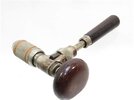
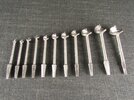
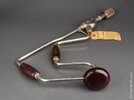
I don't. I do a mixture of modern work (refurbs. rebuilds, new extensions, etc) and work on listed buildings - often both in the same site. Some of the on-site repairs I undertake require tools of the same era as the building, so I have an eclectic mixture of modern stuff (lasers, plunge saws, cordless tools, Domino jointers, etc) and historic tools such as these:But we forget about hand tools.
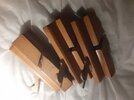
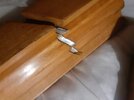
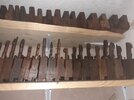
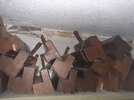

If I had to replace mine, I'd try to get lucky on fleabay, but I'd need batteries and charger too, and the ones for my current drill would be no use.I can buy a top of the line (in 18v) Makita DHP486 for £120 to £130, sans batteries.
Just seemed drill sized when I bought it.You say your Bosch is 250mm long - that's a ruddy big drill.
Thanks. Just remember that you'll need a plain start spade bit (e.g. Irwin X4 style) with a 1/4in hex shank (or under a tenner)
No - just the regular one.

I put it down to shrinkflation - the way drills keep getting smaller every year whilst the price never goes down...





Those letters all mean something. Being German the "G" probably stands for Gerate (tool). I know that "OF" in the routers stands for "OberFraese" (overhead router) - Elu used to be the same with their routers being prefixed "MOF" (for "Machine Ober Fraese"). No idea what the "P" prefix on the green Bosch DIY stuff stands for. Makita (my hobby horse of choice) has something similar with their tools - tools prefixed DHP are all combi drills, DTD are all straight impact drivers, DTL are angle (L-shaped?) impact drivers, DHR are SDS drills, and so on. The "D" is always the 18 volt LXT battery with electronic tool protection, older pre-protection tools (not made for more than 10 years) are prefixed "B" (so BTL061 vs. DTL061)GDR 18 V
The impact drivers are all GDS... (½" square) GDR... (¼" hex) and GDX... (2-in-1).
Your problem is that Bosch stopped manufacturing NiMH tools at least 9 or 10 years ago, so anything you see offered will be old stock and probably priced at whatever was the list price at the time. You will therefore struggle to find new NiMH tools and the prices will more than likely be all over the shop.As I said I did want to stick with the same battery system I already have, but there aren't many GDR 18Vs about, and of course they're long in the tooth now, and yet surprisingly expensive compared to newer Li-Ion powered ones. Which might be because Bosch also subscribe to the "let's make each new generation of products worse than the previous one" strategy.
Makita LXT (18 volt) is what I am most familiar with. I've been using it for about 18 years and changed over to Li-Ion completely about 2010. I currently have about 40 19 volt LXT tools. It's been pretty reliable (I've never made a warranty claim against Makita) and I really like the fact that they are one manufacturer whose tools are repairable because you can get the parts (and if you want to see a professional power tool repairer who espouses that opinion, take a look at a few of the repair videos on YouTube from Dean Docherty. Top man!). Which part of the range were you interested in?So I was going look today to see if the "Makita universe" is similarly consistent. Or I could ask you for a run-down on the model number convention, if there is one
Hilti are megabucks, They seem to be more of a contract hire firm these days, where people take out a contract on, say, heavy concrete breakers and if the tools break down Hilti will supply a loan tool while they repair yours. I've only got a couple of Hilti circular saws, nothing more. TBH I find their range very limited for what I do (carpentry.joinery).Then there's Hilti, and Hitachi/HiKoki/Metabo HPT...
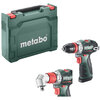
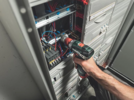
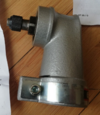

Possibly some German word for household, or diy?Those letters all mean something. Being German the "G" probably stands for Gerate (tool). I know that "OF" in the routers stands for "OberFraese" (overhead router) - Elu used to be the same with their routers being prefixed "MOF" (for "Machine Ober Fraese"). No idea what the "P" prefix on the green Bosch DIY stuff stands for.
I'm looking at used ones - you can tell from the photos how much of a hard life they've had, and so far I've always been OK (lucky?) with my purchases. I've got a 10.8/12V screwdriver and multitool, and a corded SDS, all bought used. Can't remember about the drill.Your problem is that Bosch stopped manufacturing NiMH tools at least 9 or 10 years ago, so anything you see offered will be old stock and probably priced at whatever was the list price at the time. You will therefore struggle to find new NiMH tools and the prices will more than likely be all over the shop.
See above re second hand. Although more risky - would probably not have been originally bought by a DIYer, so if used and abused by a pro, why is he getting shot?Hilti are megabucks,

Probably because it is abused - that or it's been nickedAlthough more risky - would probably not have been originally bought by a DIYer, so if used and abused by a pro, why is he getting shot?
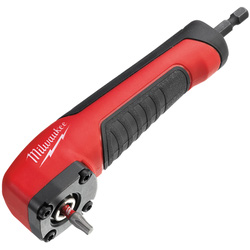


Might not be - that's a rather harsh judgement.This one is presumably stolen
I've got a 110V site transformer somewhere.but worth the price just for the 90. Standard drill mount so bin the 110V bit if you want.
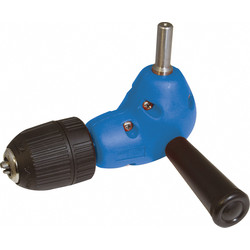
If you need to find a tradesperson to get your job done, please try our local search below, or if you are doing it yourself you can find suppliers local to you.
Select the supplier or trade you require, enter your location to begin your search.
Are you a trade or supplier? You can create your listing free at DIYnot Local
